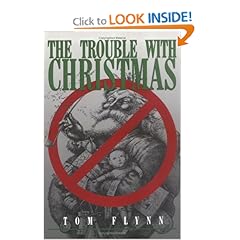Author: Tom Flynn
Publisher: Prometheus Books
ISBN: 9780879758486
What could possibly be the trouble with Christmas? It's everyone's favorite holiday and practically every American celebrates it, right? Anyone who would complain against it must be a Scrooge!

As Tom Flynn explains, that attitude demonstrates the very problem--everyone in America--Christian, non-religious, or otherwise--is expected to participate in what's supposed to be a religious holiday, and anyone who criticizes it is considered a Scrooge.
Christian Americans are puzzled when non-Christians complain about Christmas. 'Why whine? We throw this great party, and they get to crash.' 'Crash isn't the word,' non-Christians retort. 'You don't even get invited to Christmas. You get drafted.'
In The Trouble With Christmas, Tom Flynn explores American society's most popular holiday. He looks at the overwhelming influence that Christmas has on our society and wonders out loud why it's forced on everyone, Christians and non-Christians alike.
For instance, how many of the familiar Christmas traditions like Christmas trees, caroling, and exchanging presents are of specific Christian origin? Next to none. All the elements we associate with Christmas are of pagan or entirely secular origin. Only one--midnight mass on Christmas Eve--appears to be strictly Christian, and primarily only Catholic at that.
Lots of people grudgingly accept the pagan influences of Christmas, but they continue the game because the traditions are so old and familiar--haven't we been celebrating Christmas for nearly two thousand years, all the way back to the birth of Jesus? Not so, explains Flynn. Christmas has had a tiny place in most of Christian history, nearly dwindling to nothingness during the Middle Ages. The holiday that so consumes almost a third of the commercial year was nearly killed off by Protestant fundamentalists--early American Puritans objected to Christmas so much that they banned it outright wherever they held the power.
But Christmas was revived during the nineteenth century by a mere six eminent Victorians--Washington Irving, Charles Dickens, Queen Victoria, Clement C. Moore, Thomas Nast, and Francis Church. All six played a role in reviving Christmas into its familiar form, building in a false nostalgia to suggest long-held traditions.
Even more concerning to non-Christians like myself was the role that Charles Dickens played in turning culture against those who opted out of the holiday. The word "Scrooge" became an insult to anyone who didn't participate in Christmas, which kept the ball rolling into the commercial behemoth that the holiday is today.
Flynn's book, written in 1993, anticipated the War on Christmas by over a decade. He noted that as the United States becomes a more pluralistic society, more and more businesses are going to be reluctant to offend their non-Christian customers by, say, wishing them 'Merry Christmas.' Outspoken commentators like Bill O'Reilly get furious at that--the assumption seems to be that while he grudgingly admits that non-Christians are allowed to live in America, they should at least act like Christians as long as they are here. But the bluster will have less effect as more and more people ask themselves, 'Why should I be forced to acknowledge a religious holiday when I don't subscribe to that religion?'
Even secular humanists feel obligated to somehow participate in Christmas without accepting the religion it's loosely based on. Many freethinkers celebrate the Winter Solstice, for example, or, apparently unaware of the irony, co-opt pagan traditions such as Saturnalia as a way of avoiding celebrating a holiday that itself co-opted the same pagan traditions. Why, asks Flynn, do atheists buy and decorate a 'holiday tree' during December, when they don't lift a finger to co-celebrate Ramadan?
But even more important is the coming War on Christmas in public schools. Everywhere in America schools give Christmas off to all students, hold Christmas parties and plays, all under the assumption that every child is tacitly Christian. But of course, not every child comes from a Christian family, and the numbers of children of non-Christian parents will only continue to grow. Public schools are undergoing the same dilemma that state and local governments are facing when it comes to holiday displays on public property--either everyone should get their share, or no one should.
Today, Christianity is obviously favored in public schools, but what about children of Muslims? Should schools be closed for the entire month of Ramadan? What about the religious holidays of Buddhism, or Judaism, or Hindus? What holidays should children of non-theists receive? By the time all religions are afforded equality, school would be closed most of the year--an obvious impossible solution. The only alternative is for public schools to be exactly that--public, meaning secular, meaning no religious holidays are acknowledged. Religion can be taught in school, naturally, but making all kids in a fourth-grade class sing Christmas carols is nothing less than an endorsement of Christianity. If children of Christians are forced to perform make-up work from having missed a day of school so they could celebrate Christmas with their families, well, doesn't every religious leader argue that devotion to one's religion is supposed to be difficult?



No comments:
Post a Comment